 |
Convert H263 to OGV
|
Total Video Audio Converter converts H263 files to OGV quickly. With
a simple and user-friendly interface, Total Video Audio Converter makes H263 to OGV
conversion quite easy, and helps you to embed
video on your website using HTML5 easily.
Total Video Audio Converter is a professional and easy-to-use video Converter Software
that converts video files at fast speed and high quality. The software converts
any formats to popular video formats such as Windows Phone, AC3, H.264, 3G2, SWF, CAF (Core Audio Format), AAC, etc.
It could convert H264 to PPM image sequence, 3G2 to Windows Phone, WebM to OGG Vorbis, MPEG to SWF, M2TS to WMV, and so on.
Total Video Audio Converter supports batch conversion and, is full compatible
with 32-bit and 64-bit editions of Windows 10/8/7/Vista/XP/2000.

What is H263?
H263 video is a video codec standard originally designed as a low-bitrate
compressed format for videoconferencing. H.263 uses variable length coding
to be transmit symbols H.263 has since found many applications on the internet:
much Flash Video content (as used on sites such as YouTube, Google Video,
MySpace, etc.) used to be encoded in Sorenson Spark format (an incomplete
implementation of H.263), though many sites now use VP6 or H.264 encoding.
H.263 supports for a limited set of picture sizes: 128x96, 176x144, 352x288,
704x576, and 1408x1152. 4CIF and 16CIF are 4 and 16 times the resolution
of CIF respectively. The support of 4CIF and 16CIF means the codec could
then compete with other higher bitrate video coding standards such as the
MPEG standards. H.263 is a hybrid of interframe compression and intraframe
transform coding. Most new videoconferencing products now include H.264
as well as H.263 and H.261 capabilities. H.263 is a provisional ITU-T standard,
it is due to be published sometime in 1995/1996. Despite the fact that
now H.264 is more extended, H.263 is still widely employed by internet
applications such as Flash Video content (as used on sites such as YouTube,
Google Video, MySpace, etc.), desktop video conferencing, video telephony,
surveillance and monitoring, 3GPP files for playback on mobile phones.
It is also required for IP Multimedia Subsystem (IMS) and Multimedia Messaging
Service (MMS). It was further enhanced in projects known as H.263v2 (also
known as H.263+ or H.263 1998), MPEG-4 Part 2 and H.263v3 (also known as
H.263++ or H.263 2000). It was designed for low bitrate communication,
early drafts specified datarates less than 64 Kbits/s, however this limitation
has now been removed.
What is OGV?
Video file that uses the Xiph.Org's open source Ogg container format; may
contain video streams that use one or more different codecs, such as Theora;
can be played using a variety of media players. Theora video streams can
be stored in any suitable container format. Most commonly it is found in
the Ogg container with Vorbis or FLAC audio streams which provides a completely
open, royalty-free multimedia format. It can also be used with the Matroska
container. It began as a 2006 Google Summer of Code project, and it has
been developed on both the Nios II and LEON processors. This is also true
for videos encoded with any implementation of the Theora I specification
since the format freeze. Theora is well established as a video format in
open source applications, and is the format used for Wikipedia's video
content. However, the proposed adoption of Theora as part of the baseline
video support in HTML5 resulted in controversy. NOTE: Audio files that
use the Ogg container are called Ogg Vorbis files, where "Vorbis"
refers to the specific compression algorithm used for the audio data. The
term "Vorbis" does not apply to Ogg video content. The Theora
I bitstream format was frozen in June 2004 after the libtheora 1.0alpha3
release. Theora is a free and open video compression format from the Xiph.org
Foundation. Evaluations of the VP3 and early Theora encoders found their
subjective visual quality was inferior to contemporary video codecs. More
recently however, Xiph developers have compared the 1.1 Theora encoder
to YouTube's H.264 and H.263+ encoders, in response to concerns raised
in 2009 about Theora's inferior performance by Chris DiBona, a Google employee.
They found the results from Theora to be nearly the same as YouTube's H.264
output, and much better than the H.263+ output.
How to Convert H263 to OGV?
- Free Download Total Video Audio Converter
- Install the Program by Step-by-step Instructions
- Launch Total Video Audio Converter
- Choose H263 Files

Click "Add Files" to choose H263 files.
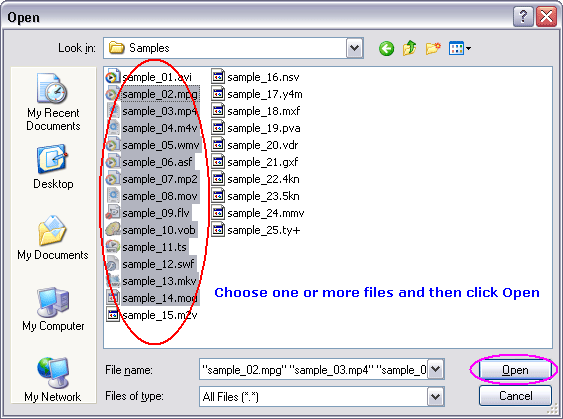
Choose one or more H263 files you want to convert and then click Open.
Total Video Audio Converter will open the files and get file
information such as width, height, frame rate, video bit rate, audio sample rate,
audio bit rate, audio channels, and then list the information at conversion list.
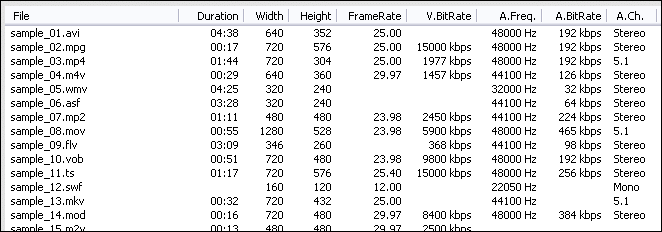
- Choose Output Format
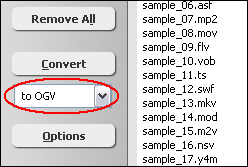
Click on combo box of output format and then choose "to OGV".
- [Optional, for advanced user]
Set Encoding Parameters
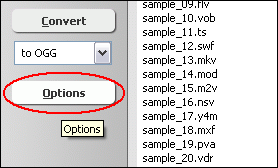
If you want to change OGV encoding parameters such as bit rate, frame rate, video
size, please click "Options".
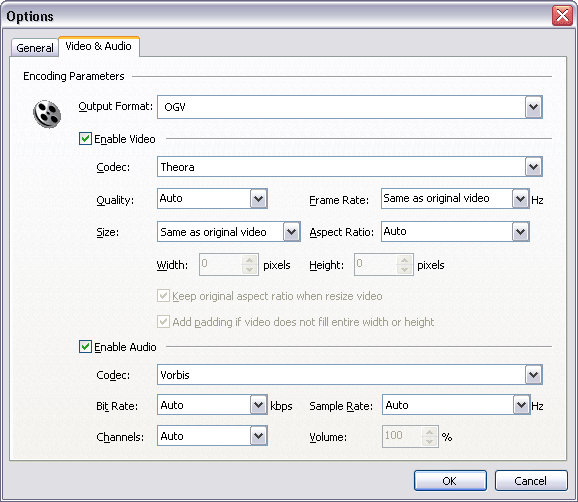
And then, switch to tab "Video & Audio" and then set options.
- Convert H263 to OGV
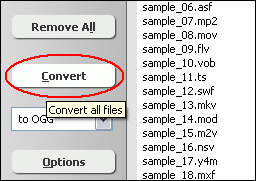
Click "Convert" to convert all H263 files in list to OGV format.

The software is converting H263 files to OGV.
- Play & Browse
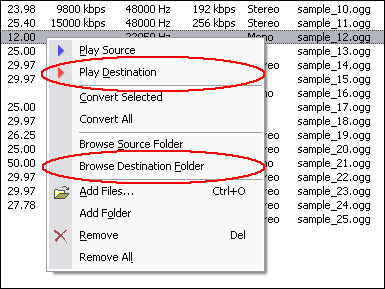
When conversion completes, you can right-click converted item and choose "Play
Destination" to play the outputted OGV file; or choose "Browse Destination
Folder" to open Windows Explorer to browse the outputted OGV file.
- Done
Top
H263 to OGV Software is 100% clean and safe to
install. It's certified by major download sites.

Convert H263 to OGV Related Topics:
|











